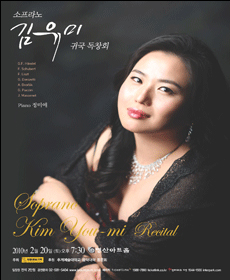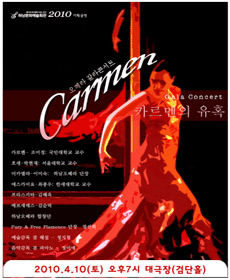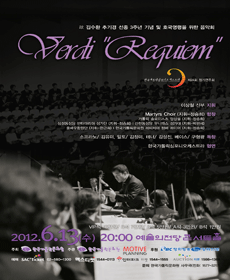G.F. Handel (1685-1759)
Bel piacere 참 기쁨
Care selve 사랑스런 숲
F. Schubert (1797-1828)
Lied der Mignon 미뇽의 노래
-from Gothe’s ‘Wilhelm Meister’
Kennst du das Land, wo die Zitronen bluhn 그대 그 나라를 아시나요?
Heiß mich nicht reden 말하라 하지 마세요.
So laßt mich scheinen, bis ich werde 나를 이대로 있게 해줘요.
Nur wer die Sehnsucht kennt 오직 그리움을 아는 사람만이
F. Liszt (1811-1886)
Comment, disaient-ils 어떻게 그에게 물었다.
Oh! Quand je dors 오! 내가 잠들거든
-Intermission-
G. Donizetti (1797-1848)
Piangete voi?...Al dolce guidami castel natio
울고 있나요?... 내가 태어난 성으로 데려가 주오.
-From the Opera ‘Anna Bolena’
A. Dvorak (1841-1904)
Mesicku na nebi hlubokem 달에 부치는 노래
-From the Opera ‘Rusalka’
G. Puccini (1858-1924)
Si, Mi chiamano Mimi 내 이름은 미미
-From the Opera ‘La Boheme’
Signore, ascolta! 주인님, 들어주세요.
-From the Opera ‘Turandot’
J. Massenet (1842-1912)
Il est doux, il est bon 그는 부드럽고 상냥한 분이예요.
-From the Opera ‘Herodiade’


 3
3 45
45 7
7





































 주간
: -위
주간
: -위 








 첫번째 평가를 해주세요.
첫번째 평가를 해주세요.




















